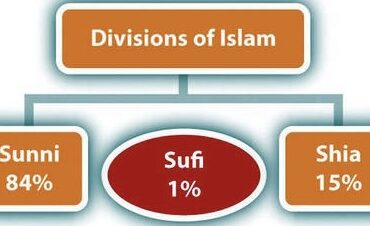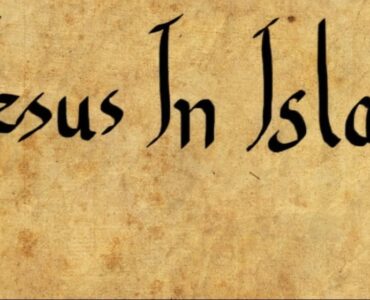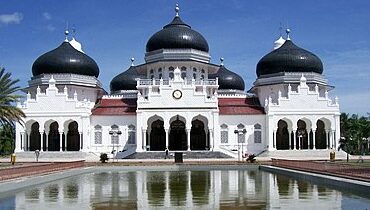
Who Are The “People Of The Book?”
Below is a list of religious populations by number of adherents.
Adherents In 2020
Religion Adherents
- Christianity 2.3 billion
- Islam 1.9 billion
- Judaism 14 million
- Other Religions 3.576 billion
Total 7.79 billion
There are three major religions which have arisen out of the Middle East.
Are The Qur’an & The Bible Really So Different?
The Qur’an presents itself as the Bible’s sequel and always refers to the biblical Torah (al-tawrat), Psalms (al-zabur) and New Testament (al-injil) with honor and respect. It says it confirms, clarifies and guards them from misinterpretation. The Qur’an asserts that it was revealed by the God of the Bible, which it claims predicted Muhammad’s coming. The Qur’an also suggests that the Bible was revealed in the same manner and form as it was. All these things imply a trustworthy Bible.
In many respects, however, the Bible and the Qur’an are profoundly different.
- The Qur’anic concept of revelation excludes any notion of human authorship. Yet the biblical texts all had human authors, though angelic mediators were sometimes involved;
- In addition, the Qur’an calls humankind to a far more distant relationship with God than does the Bible;
- The Qur’an never presents God as ever coming to earth, as the Bible clearly does;
- It says nothing of God’s atoning work on our behalf, a central biblical theme;
- The Qur’an doesn’t suggest that God accepts sinners on the basis of his grace alone, another key biblical theme;
- The Qur’an denies that Jesus is God’s Son, while the New Testament presents Him as God’s Son in a radically different sense from what the Qur’an denies;
- The Qur’an presents the Christian scripture (al-injil), or New Testament, as a single book received by Jesus, but it’s always been a collection of books written by his followers;
- The Qur’an speaks so little of Jesus’ death and the resurrection that most Muslims now deny that it even happened, yet their historicity is central to the New Testament.
‘These tensions demand resolution. Though it wasn’t always the case, Muslim scholars today almost universally attack the Bible, asserting that its texts originally conformed to Qur’anic expectations, but were later falsified. Many consider the New Testament fabricated and claim the Qur’anic injil refers to a no longer surviving “original Gospel,” which Jesus allegedly received. Due solely to its polemical power, nearly all Muslims now accept the falsification theory, with most convinced it’s an indisputable fact.
But despite its immense popularity, the falsification theory isn’t true, as can easily be shown.
First, what the Qur’an says of the biblical scriptures strongly supports the view that they were intact in Muhammad’s time. In addition to the implicit points with which we began:
- Q 5:46-48 commands Christians to judge by what their Scripture says, so it doesn’t consider the New Testament falsified. Likewise, Testament falsified. Likewise, the passage says the Qur’an stands as guardian over the Christian scripture: it’s not claiming to guard a falsified New Testament.
- Q 3:84 and 4:136 say Muslims must and do believe the biblical Scriptures: it doesn’t caution them to believe only what those Scriptures originally were. Most early commentators say the Qur’anic texts now taken to refer to falsification accused Jews and Christians of misquoting or misinterpreting — not altering — their texts.
Second, not only does the falsification theory lack sound evidence in the Qur’an and early Qur’anic commentary, but a veritable mountain of manuscript evidence also directly contradicts it. Given the scope and nature of the changes allegedly made to the Bible, the scale of the forgery would have been massive. However, thousands of early, carbon-dated manuscripts, clearly demonstrate the authenticity of the Scriptures Jews and Christians possessed in Muhammad’s day, the same as now.
Not one early manuscript points to the sort of changes necessary for the Muslim falsification theory to be true. There’s absolutely no evidence that Jesus received a no-longer-extant “original Gospel.”
Christian scholars candidly admit that many variants exist within the myriad of biblical texts. But with so many manuscripts to compare, errors are easily spotted. And most of those are minor copyist’s mistakes, typical of all ancient manuscripts — the Qur’an included. For as with all Scripture, the belief that it was sacred, instilled in the Bible’s custodians a passion to preserve its text from corruption.
Last, not only is the falsification theory contradicted by both the Bible’s textual evidence and the Qur’an itself, it’s also illogical. For no Scripture-based community would deliberately alter its Scriptures on the scale the theory demands. Knowing that, leading Muslim scholars like Ibn Qutayba, Ibn Kathir and Wahb bin Munabih rejected the falsification theory as untenable. In addition, Christians could never have changed their Scriptures radically, identically and universally without leaving a trace. For Christianity had spread as far afield as Ireland and India well before Muhammad’s time. The same is true of Jews, who were equally widespread. Radical changes to the biblical Scriptures would have generated fierce controversy within their communities, and there’s no evidence for that in either Christianity or Judaism’s well-documented histories. Nevertheless, the Muslim community embraced the falsification theory — simply due to its polemical force. Likewise, many Muslims today accept the Gospel of Barnabas as authentic, though reputable Muslim scholars acknowledge it to be spurious.
The Muslim community’s embrace of the falsification theory — with its implicit accusation that Jews and Christians promulgate corrupted Scriptures — is tragic because it:
- Falsely impugns the Bible, disinheriting Muslims of a vast wealth of scriptural wisdom;
- It often undermines friendship between our communities and shuts down interfaith dialogue;
- It frequently encourages Muslim hostility — including violent aggression — toward Jews and Christians, even today.
Anyone disturbed by this realization can take comfort in God’s promise to guide all who seek Him with an undivided heart. No community is infallible, deserving unquestioning loyalty — however captivating or imposing its claims. But by the same token, we aren’t responsible for our community’s response to God’s guidance — just our own response.
The Bible and Qur’an differ most radically on Jesus. Like the Bible, the Qur’an calls him the Messiah, but Muslim scholars don’t agree at all on what that title means. The Jewish scriptures — which Christians also believe — present the Messiah as the man God promised to send to restore justice on earth and reign as king. The New Testament says Jesus fulfilled that promise, though very differently than expected. It also boldly declares that everyone’s eternal destiny will be decided precisely by their response to the Messiah. And that makes it of the utmost importance that we understand what the Bible says the Messiah came to do.
Do Muslims & Christians Worship The Same God?
A speaker at a large Bible conference, advocating for adherence to the fundamentals of faith and seeking to stir controversy, commented that there were missionaries who actually used “Allah,” the Muslim name for God, in their Christian witness.
The statement elicited the intended shock effect as there was an audible gasp of incredulous disbelief among the audience that this could be true. The reaction revealed a common perception that confuses linguistic distinctive with theology.
Every language has its word for “God” which is used in translation of Scripture and for proclaiming the Gospel within any particular culture and language. Muslims use the Arabic word, “Allah,” just as we use the English word, “God,” and Spanish speaking believers use the word “Dios.” “Allah” is the word that has been used for centuries by Jews and Christians in the Middle East and actually pre-dates the founding of Islam in the seventh century. When Bibles are translated in predominantly Muslim countries into local languages such as Indonesian, Malay and Bengali, they often-times use “Allah” as the biblical reference to the sovereign creator God.
However, when “Dios” in Spanish is used, it is in reference to the Christian God, whereas, when the word “Allah” is used by Muslims and in the Qur’an, it is not the same God. If it were, we would all believe the same, worship the same, and read the same Scripture. Islam has made a change, not unlike other groups that have moved away from traditional Christianity and use other books besides or in place of or in addition to the Bible.
Revelation 22: 18-1 makes it clear:
“I warn everyone who hears the words of the prophecy of this book: if anyone adds to them, God will add to him the plagues described in this book, and if anyone takes away from the words of the book of this prophecy, God will take away his share in the tree of life and in the holy city, which are described in this book.”
Some believe that to not use “Allah” for God would require the use of a foreign word that would not be understood in the local language and that Muslims would have to learn English, Greek or Hebrew in order to discuss theological concepts and understand the Gospel.
Perhaps it is only a matter of semantics to some, but I believe it’s more than that – much, much more. Islam teaches that the Scriptures used by Christians and Jews has been corrupted and Allah has introduced the Qur’an in order to correct these errors.
Muslims believe that the use of Allah in Islamic literature refers to the God who created Adam and Eve and the world. He is the God who brought the flood and was the God of Abraham, Isaac and Jacob (and Ishmael), as well as David, Isaiah and other prophets known in common.
Some Christian apologists believe that to introduce another identity than the monotheistic sovereign creator deity of the Bible who is not Allah would create a greater gap and barrier to witness than trying to explain the trinitarian nature of God. However, I find this response weak in that it is a man-made-response to which does not allow for God, Himself, to bridge that gap.
The distinction in the concept of God worshipped by Christians and Muslims is one of theology, just as with Mormons and Jehovah Witnesses, who do not share an identical concept of God with that of evangelical and mainstream Christians.
While we must not confuse the cultural and linguistic bridges of communication in seeking to transcend diverse worldviews, we must be clear about who we worship, who we pray to, who we seek forgiveness from and much more. When Paul proclaimed to the people of Athens that he was there to introduce the God represented by their temple to an unknown god, it is doubtful that they were consistent with what Paul declared as revealed in Jesus Christ. But Paul was able to establish a point of identity with their worldview that he might introduce them to the true and living God.
Jews worship the true and living God and seek to live according to His laws, but do they fully understand the nature and character of God as revealed in Jesus Christ? Paul declared in Romans 10:2 that they have a zeal for God but not according to knowledge. There is no question that Muslims have a zeal for god (Allah), but not according to knowledge of His true nature and character.
It has been an intriguing question as to whether or not Muslims and Christians worship the same God. Is there more than one God? No, there is only one God, and He can be known only through knowing Jesus Christ. How compelling it should be for us to declare to Muslim friends, devout in their faith, as Paul did in Athens, “what you worship as impersonal and unknown I proclaim to you.” And we should be confident that when one comes in genuine repentance and faith to Jesus Christ that God is able to reveal Himself in spirit and truth to a new believer.
There are two separate divine beings worshipped respectively by Christians and Muslims, and there are very distinct theological concepts of this all-powerful, creator God of the universe. There is only one true God and He can be known only through Jesus Christ.
Who Are The “People Of The Book?”
Do not be fooled by thinking Islam is like Judaism and Christianity, Peoples’ of the Book, an Abrahamic religion. If they were a true people of the Book, they would follow the Book, the Bible, not the Qur’an. Islam worships a false god, a deity named Allah. A zebra may claim to be a horse, but that doesn’t make it so.
- Jews believe and follow the Bible (OT) and it’s inerrancy;
- Christians follow the Bible (OT, NT) and it’s inerrancy;
- Islam follows the Qur’an, finding the Bible to be at fault and in error.
I know of no Christian theologian who would call Mormons or Jehovah Witnesses “People of the Book,” and I do not believe Muslims should have that distinction either.
621 – 012




[…] to the Abrahamic religions (you may be interested in this article: Who Are The People Of The Book?), Islam teaches that there will be a resurrection of the dead that will be followed by a final […]